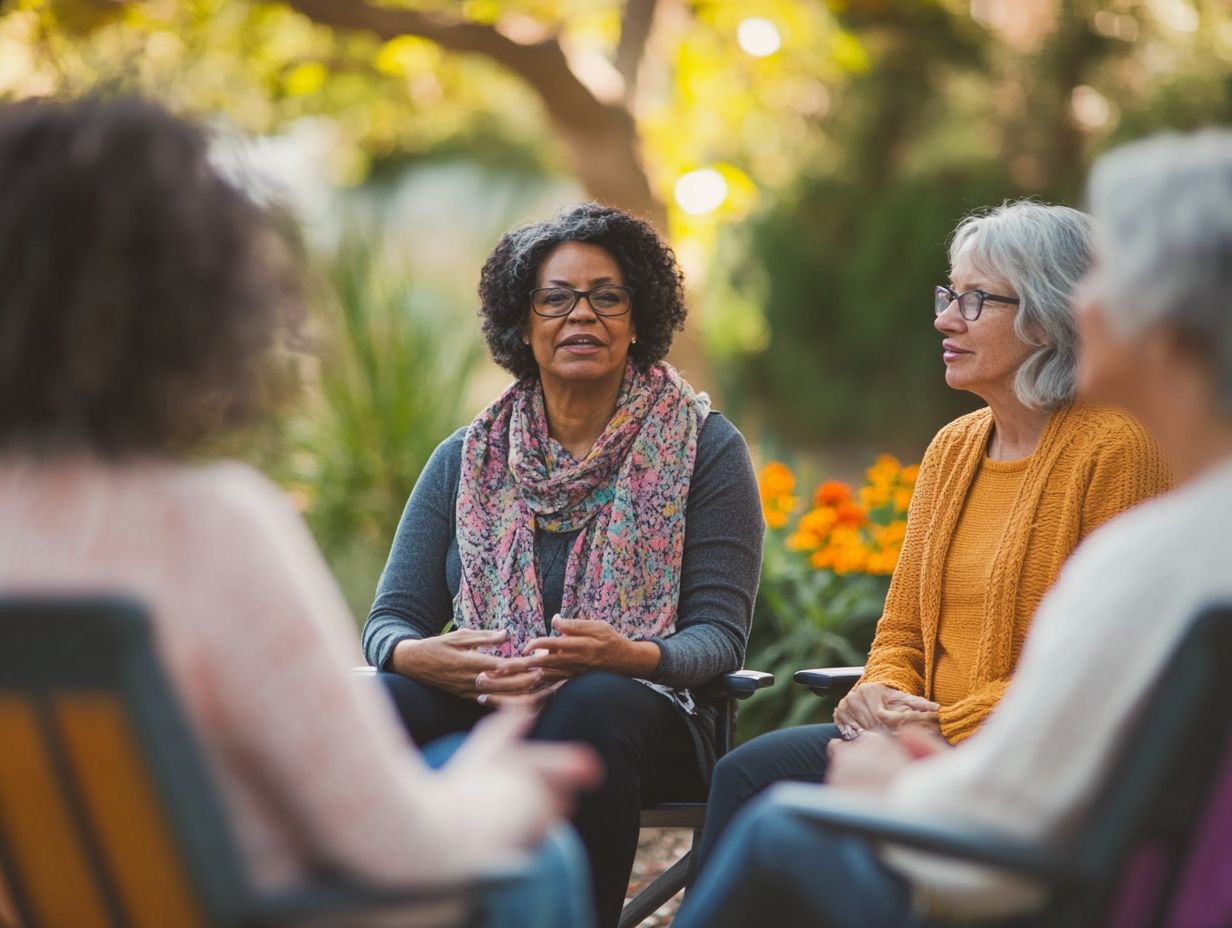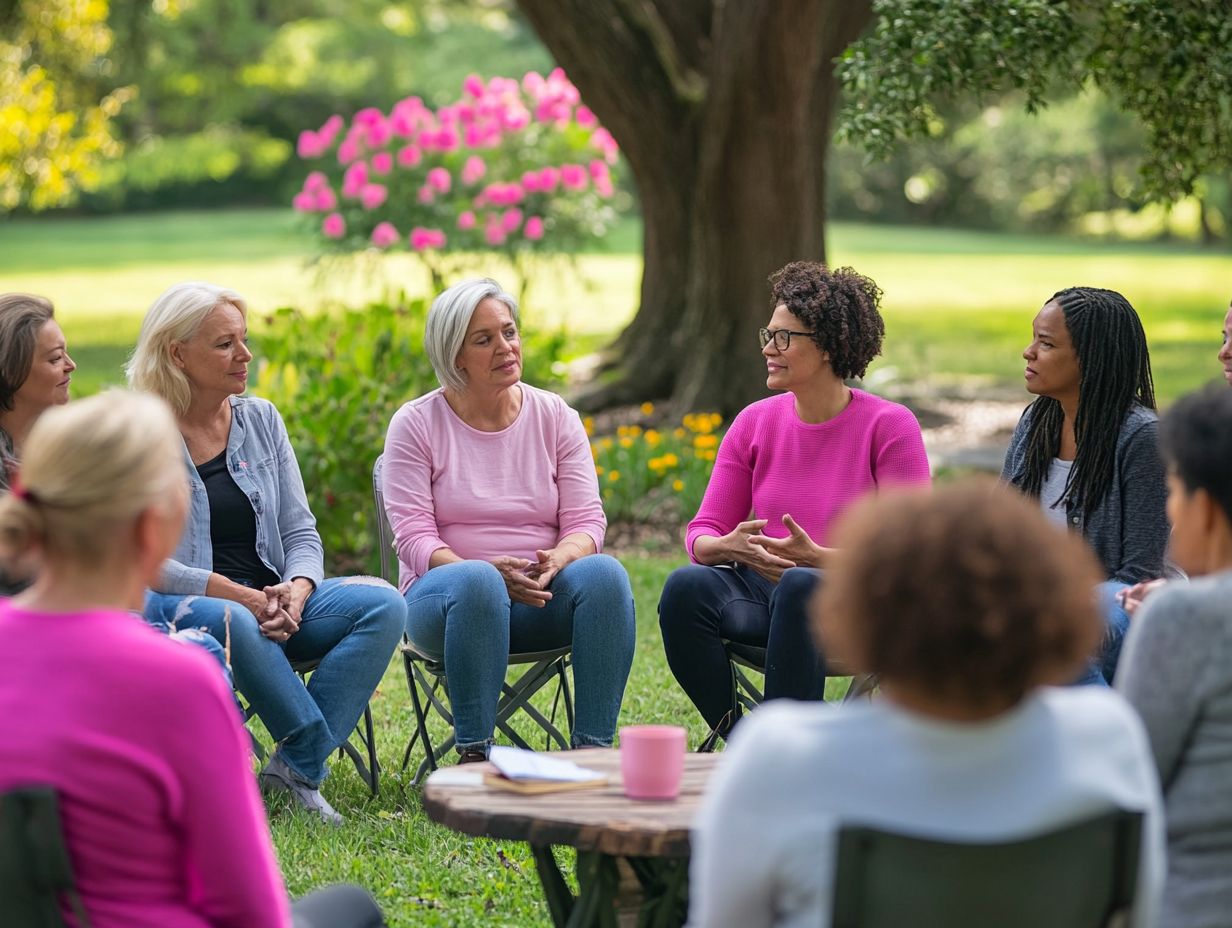Addressing survivorship issues after cancer involves navigating the physical, emotional, and financial challenges that many cancer survivors face post-treatment. These issues, including side effects from cancer treatment, emotional struggles like anxiety and depression, and financial burdens due to medical expenses, significantly impact survivors’ quality of life.
Cancer survivors can benefit from tailored coping strategies such as:
- Joining support groups
- Developing wellness plans
- Leveraging family support
- Consulting with health care providers for personalized recommendations
- Joining support groups
- Developing wellness plans
- Leveraging family support
Additionally, resources including support organizations like the American Cancer Society and NCI, financial assistance programs, and personalized wellness plans offer essential guidance and support for navigating life after cancer.
Understanding and addressing these survivorship issues is crucial for cancer survivors to regain a sense of normalcy and improve overall well-being. For a comprehensive approach, survivors are encouraged to engage with support systems and adopt lifestyle changes that foster long-term health and resilience.
Key Takeaways:
Understanding Survivorship Issues

Survivorship issues refer to the challenges faced by cancer survivors after treatment, including physical, emotional, and psychosocial health effects. Understanding survivorship issues is important for managing long-term health and well-being. Survivors often deal with treatment side effects and the need for ongoing medical care, which may include follow-up care and monitoring for late effects and second cancers.
Common Challenges Faced by Cancer Survivors
Cancer survivors face common challenges including physical changes from cancer treatment, emotional changes like anxiety and depression, and financial struggles due to medical bills and lost income. These issues can be particularly pronounced in childhood cancer and older adults.
Challenges impact cancer survivors’ quality of life and require attention for effective follow-up care and resource allocation, including access to clinical trials and psychosocial support.
Physical, Emotional, and Financial Struggles
Cancer survivors often face physical, emotional, and financial struggles, impacting their physical health and mental health.
- Physical Struggles: Treatment can cause fatigue, hair loss, and weight changes, affecting self-esteem and daily activities.
- Emotional Struggles: Survivors may experience anxiety, depression, or PTSD, impacting recovery and work re-entry.
- Financial Struggles: Medical bills and lost income during treatment contribute to financial stress.
Resources like support groups, counseling, and financial aid from organizations such as the American Cancer Society, Dana-Farber, and the National Comprehensive Cancer Network can assist survivors.
Coping Strategies for Survivorship Issues
Coping strategies for cancer survivors include:
- joining support groups
- creating a wellness plan
- utilizing family support
These strategies help manage emotions and improve life quality after cancer, also aiding in coping with long-term psychosocial health challenges.
Addressing Specific Survivorship Issues
Specific survivorship issues for cancer survivors include managing side effects, addressing long-term treatment impacts, and overcoming fear of recurrence. Recommendations from health care providers can guide these processes effectively.
Survivors face challenges in adjusting to new social dynamics and relationships after treatment, especially regarding family interactions and changes in perspective on life.
Addressing these issues helps cancer survivors regain normalcy and improve life quality post-cancer.
Managing Side Effects and Long-Term Effects

Managing side effects and long-term effects after cancer treatment involves monitoring and addressing physical and emotional challenges to maintain quality of life.
Survivors may experience fatigue, pain, cognitive changes, and psychological issues, requiring regular follow-up care and proactive management strategies.
Effective management includes lifestyle changes like nutrition and exercise, alongside support groups and counseling for emotional support.
Dealing with Fear of Recurrence
Fear of recurrence is a common emotional challenge for cancer survivors, impacting mental health and well-being.
Managing fear of recurrence involves using coping strategies such as mindfulness, support groups, and professional counseling.
Connecting with cancer support organizations provides resources and tools to help survivors manage anxiety and regain control.
Navigating Relationships and Social Interactions
Cancer survivors face challenges in navigating relationships and social interactions due to changed perspectives.
Open communication about feelings and fears is vital for re-establishing connections and receiving family support, playing a critical role in rebuilding psychosocial health.
Expressing changed priorities can help survivors form deeper connections.
Support groups and community gatherings offer safe spaces for sharing experiences and rebuilding social interactions.
Resources for Cancer Survivors
Resources for cancer survivors include support groups, survivorship organizations, and financial assistance programs. These can be particularly beneficial for older adults and those facing childhood cancer survivorship challenges.
Support groups provide emotional and social support, while survivorship organizations like ASCO and the Journal of Clinical Oncology offer guidance for life after cancer.
Financial assistance programs help survivors manage medical and daily living expenses.
Support Groups and Organizations
Support groups and organizations provide emotional support, shared experiences, and resources for cancer survivors.
Organizations like the American Cancer Society and NCI help survivors connect with others and find community.
The Cancer Support Community offers programs like online support groups and educational workshops, which can be essential for maintaining psychosocial health and emotional stability.
The Leukemia & Lymphoma Society provides financial assistance and personalized support for patients and families.
Joining these groups can enhance emotional well-being and reduce feelings of isolation.
Financial Assistance and Legal Aid

Financial assistance and legal aid for cancer survivors help cover treatment costs, housing, transportation, and daily expenses.
Organizations like the American Cancer Society and the HealthWell Foundation offer financial aid programs for cancer patients.
Legal aid services assist with employment rights, insurance disputes, and estate planning for cancer survivors.
Cancer survivors can access these resources through local cancer support groups or healthcare providers.
Wellness Plans for Cancer Survivors
Wellness plans for cancer survivors focus on improving physical and emotional health post-treatment by incorporating balanced nutrition, regular exercise, and mental health support. These plans are essential for addressing late effects and fostering overall well-being.
A wellness plan involves specific dietary changes, such as increased fruit and vegetable intake, regular physical activities like walking or yoga, and counseling or support groups to maintain mental well-being.
Personalized wellness plans give the power to cancer survivors to manage their health effectively, ensuring they can cope with both physical changes and emotional challenges.
Components of an Effective Wellness Plan
An effective wellness plan for cancer survivors includes nutrition, exercise, and mental health support.
Nutrition involves a balanced diet with fruits, vegetables, lean proteins, and whole grains to boost immunity.
Exercise includes regular physical activity, such as walking or yoga, to improve fitness and mood.
Mental health support involves therapy or mindfulness practices to process emotions and build resilience.
These components support recovery, physical health, and overall well-being, providing a foundation for life after cancer.
Frequently Asked Questions
What are some common survivorship issues faced after cancer?
Some common survivorship issues faced after cancer include physical and emotional changes, financial burden, fear of recurrence, and difficulty readjusting to daily life. Challenges are present in both adult survivors and children.
How can I address physical and emotional changes after cancer?

You can address physical changes through therapy, exercise, and self-care practices. For emotional changes, seek support from loved ones, join support groups, and consider therapy or counseling.
What resources are available to help with the financial burden after cancer?
There are various resources available such as financial assistance programs, grants, and support from non-profit organizations. You can also speak with a financial advisor for personalized assistance.
How can I cope with the fear of cancer recurrence?
Coping with the fear of recurrence can be challenging, but some strategies include staying proactive with follow-up appointments, practicing self-care, and talking to a therapist or support group. It’s also important to focus on the present and not let fear consume you.
How can I readjust to daily life after cancer?
Readjusting to daily life after cancer can take time, and it’s important to be patient and kind to yourself. Set realistic goals, maintain a healthy lifestyle, and seek support from loved ones or a therapist to help navigate this transition.
What can I do to advocate for myself as a cancer survivor?
Advocating for yourself as a cancer survivor is crucial. Some tips include staying informed about your health, communicating openly with your healthcare team, and seeking support from advocacy organizations or support groups. It’s also important to set boundaries and prioritize self-care.





